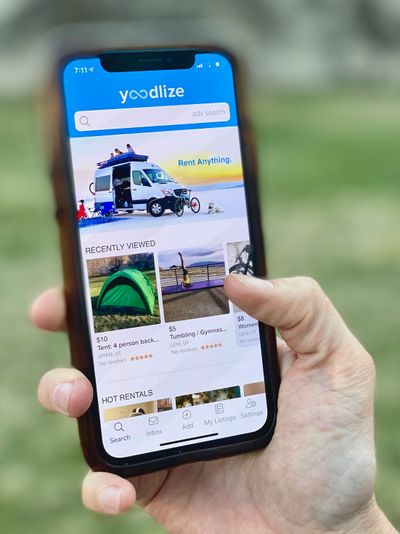By Joseph Woodbury, CEO/co-founder, Neighbor.
This article was originally published in the Spring 2018 edition of Silicon Slopes Magazine.
Reading the Tea Leaves
In 1994, Jeff Bezos left his position as vice-president of a Wall St. firm to do the unthinkable: connect writers and publishers directly to their readers. No middleman. No in-house barista. No fancy displays. No one to pre-screen likely bestsellers or optimize for the best print margins. If you could publish it, Amazon would sell it. It instantly became “Earth’s Biggest Book Store.”
Bezos saw something in the tea leaves that others didn’t, and something about Amazon’s model helped it weather the dot-com bubble a few short years later, while so many other successful internet companies failed. In 2000, bankruptcy replaced IPO’s, and the future of the internet became uncertain. But not for Amazon and Bezos. Amazon survived, and so did the internet.
Thriving, Not Surviving
After the internet recovery, thousands of tech companies began, once again, to leverage the internet for high growth and returns. But certain companies began to rise to the top and dominate the headlines. This was the age of Google and eBay, then Netflix and Facebook. In fact, as of May of last year, the six largest internet-based companies in the U.S. were Google, Amazon, Facebook, Priceline, Uber and Netflix, respectively. Commonly referred to as the “tech giants,” these behemoths have amassed a combined valuation of over $2 trillion (more than the next top 20 internet-based companies combined).
Again, there is clearly something fundamentally different about these companies that pushed them to the top.
The Age of the Marketplace
So, what is it that makes these tech giants different from the rest of the successful companies out there? What do the tech giants have in common with each other? The answer: each of these companies is a marketplace.
Oh, so you’ve never thought of Google as a marketplace? Of course, Amazon is easy to understand. There are buyers and there are sellers, and they come together to form a relationship on Amazon.com. But likewise, Google is simply a marketplace where creators of websites and consumers of websites meet up for the first time. Need a place to listen to music? Google your question, and get connected to Spotify’s music. Need a place to store your car, boat or boxes? Google it, and meet Neighbor for the first time.
Netflix is also a marketplace connecting TV and movie studios with eyeballs everywhere. Facebook connects friends with, well, friends. Priceline connects hotels with travelers. And of course, Uber connects Francine and her white Honda Accord to Ronald and Jerry at the airport.
The Secret of the Internet
It’s a secret hiding in plain sight, so easy to miss that many internet experts look right past it. The internet was built for marketplaces because the internet is a marketplace.
Sure, other types of companies live and even thrive on the internet, just like an old newspaper can be repurposed as an umbrella. Barnes and Noble can start selling books online and improve their margins by cutting out brick and mortar. But a newspaper is best used for reading, not umbrella-ing, and retail ecommerce websites will never be as big or as effective on the internet as marketplaces, whether they’re selling fidget spinners or cars. Companies selling products online come in waves and fads, but online marketplaces last forever.
The secret is out: the internet was built for marketplaces, and marketplaces get the most out of the internet.
Utah’s Emerging Adulthood
This is the place! for marketplaces. As Utahans, we’ve conquered the world of SaaS with Workfront, Instructure, Lucid, Domo and more. We took on consumer retail and brand with Skullcandy and Cotopaxi. But with the organization of conferences like the X4 and Silicon Slopes summits and the construction of satellite offices by big tech orgs like Snap, Adobe and dare-we-say Apple garnering the national spotlight, Utah needs more marketplaces to grow into its potential.
Overstock led the Utah charge by connecting smart shoppers to overstocked inventory. Pluralsight has followed suit by connecting the brightest coders to the best coding courses and mentors (if you needed any more proof that marketplaces are BIGGER, just look at how these two have dominated as Utah’s largest internet-based companies). And of course, Homie has forever changed the Utah real estate market with their clean technology solution to home buying.
As Silicon Slopes evangelist Brad Rencher recently told me, “Utah has got to think even bigger.” He’s absolutely right; we need marketplaces that are providing solutions to consumers in the largest of all markets.
Neighbor’s team has chosen the self storage market for this very reason. Currently, 1 in 10 American families is locked into a self storage lease, with more storage facilities in the U.S. than McDonald’s, Starbucks, Burger Kings, Dunkin’ Donuts, Wendy’s and Domino’s Pizza locations combined. This massive industry has a market cap that exceeded $500 Billion in 2017. Neighbor drastically disrupts and improves self storage by providing a one-stop shop where good people with unused space can make $2,000–4,000 per year and those in need of storage can rent that space from them for 50% the price of traditional storage, in a safe, accessible location right in their very own neighborhood.
Bringing Communities Together
Consumers are hungry for places where they can compare products from many different sellers side-by-side, with standardized reviews and listings. In fact, the internet loves marketplaces so much because they provide standardization and allow people freedom to go right to the source. Marketplaces truly are the secret of the internet.
But at Neighbor, we’re even more passionate about marketplaces because they bring communities together. It’s a wonderful feeling of trust to know that a real person with a real need is able to store their valued belongings in their neighbor’s valued space. We’ve watched as individuals who’ve lived right next door to each other for years without ever meeting personally have connected for the first time on our platform.
Neighbor made the difference in strengthening their friendships and drawing them off of social media and into their neighborhoods. Marketplaces are different because they bring people and communities together like no other company can.






